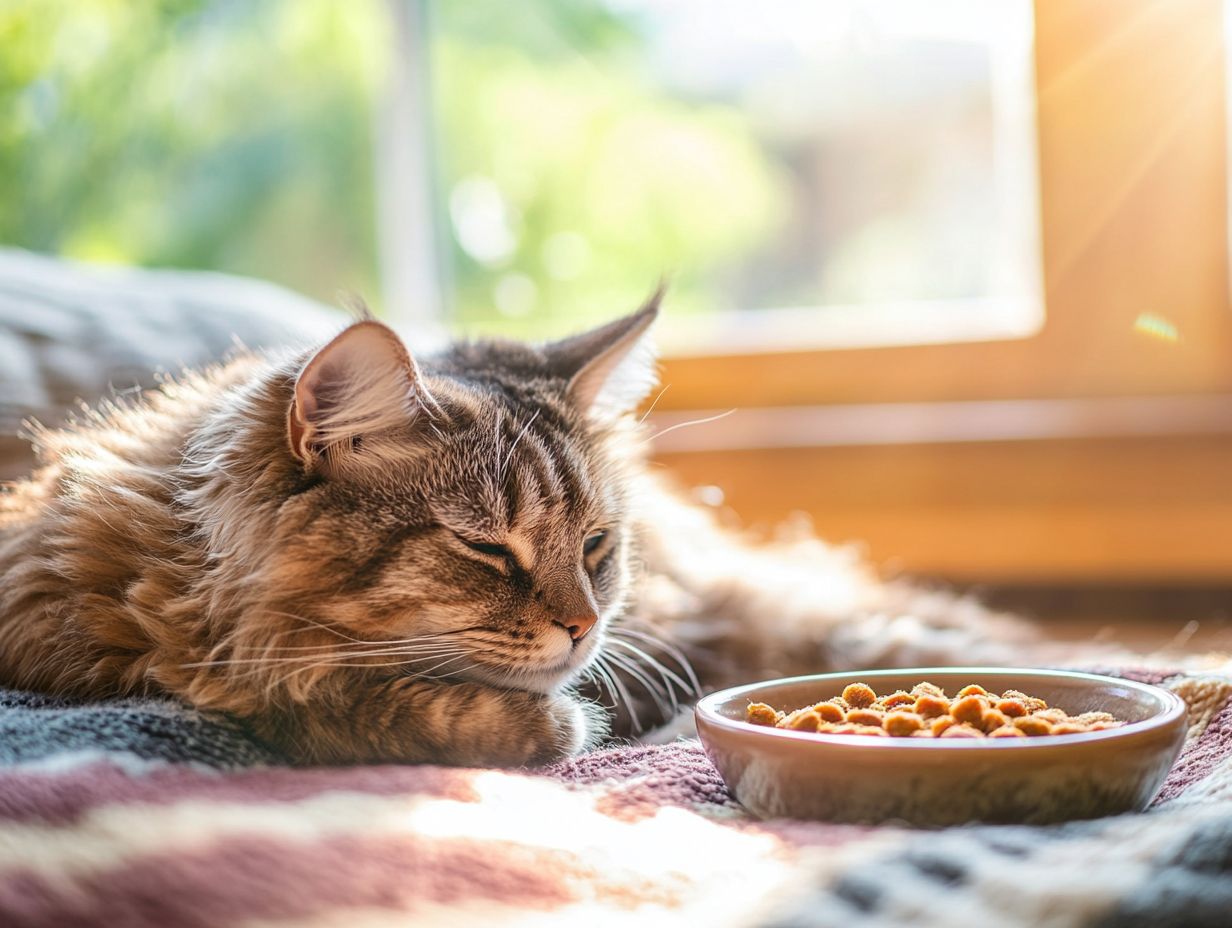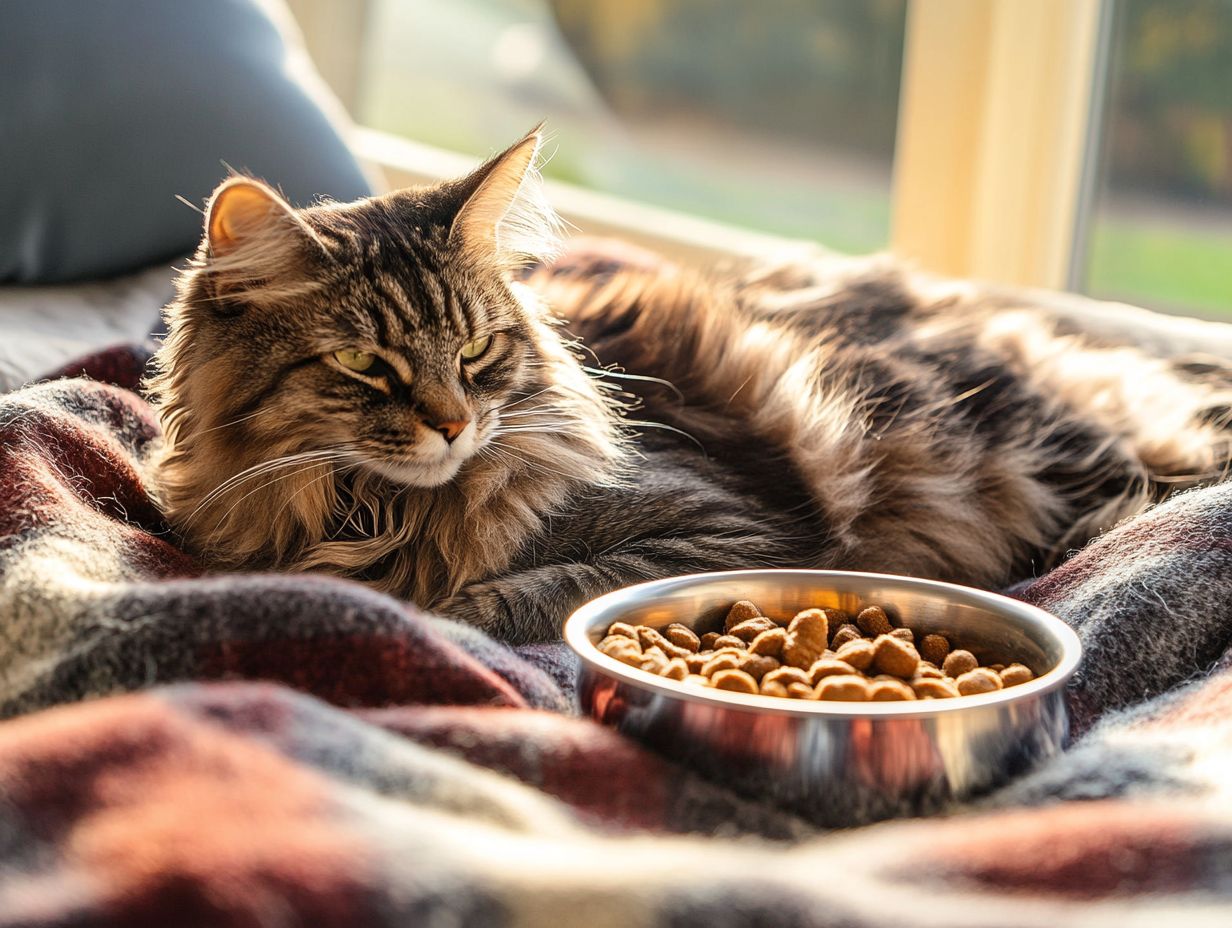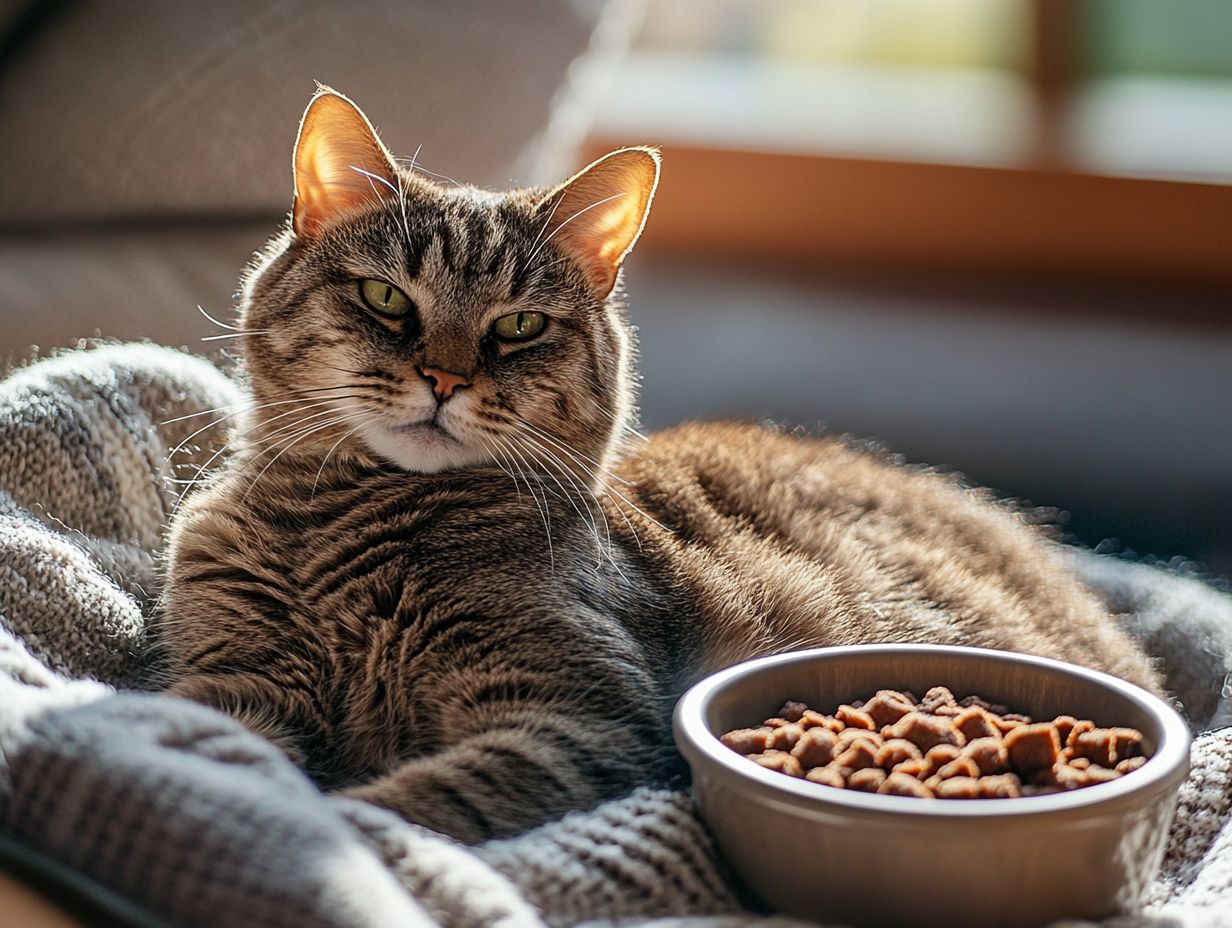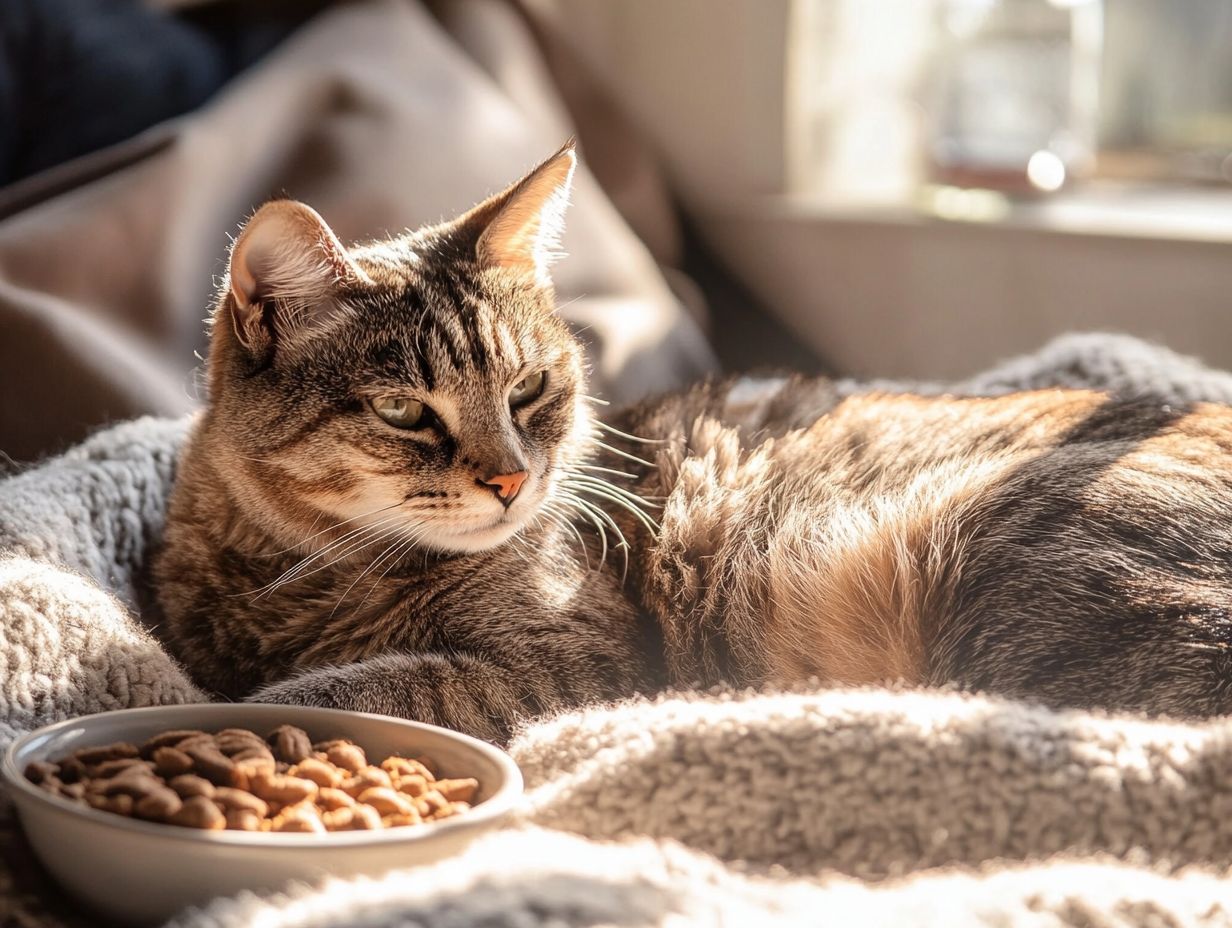As our feline friends age, their dietary needs evolve, making a high-protein diet increasingly important for senior cats, especially those experiencing the aging process and sarcopenia muscle loss. It is vital to verify these claims by referencing current veterinary guidelines and studies from organizations like AAFCO and WSAVA.
Protein plays a vital role in maintaining muscle mass, supporting organ function, and boosting energy levels, all crucial for enhancing the quality of life in older cats. Ensuring protein quality and digestibility is essential for these healthy older cats. However, it is important to consider the potential risks associated with high-protein diets, including kidney health concerns for cats predisposed to renal issues.
This article explores the benefits of a high-protein diet specifically tailored for senior cats, offers insights on their protein requirements, and provides practical tips for transitioning to this diet while ensuring your cat’s health and well-being. It is important to consult with a veterinary team to tailor diets according to individual health needs, particularly for cats with chronic conditions like kidney disease or diabetes.
Dive in to discover how you can support the health of senior cats!
Key Takeaways:

What is a High-Protein Diet for Cats?
A high-protein diet is essential for meeting the nutritional needs of older cats, particularly senior cats suffering from chronic kidney disease and sarcopenia, or muscle loss. This diet emphasizes the quality and digestibility of protein, ensuring that older cats receive sufficient amounts of the necessary amino acids to support both their muscle condition and overall health. The dietary protein intake must be balanced with the dietary phosphorus content to protect kidney health.
Veterinarians recommend balanced amounts of high-quality protein sources, such as chicken and eggs, while also considering the cats’ dietary water intake and specific health requirements. It is crucial to monitor how these adjustments affect individual cats, especially those with conditions like kidney disease or diabetes.
Why is Protein Important for Senior Cats?
Protein plays a crucial role in the health of senior cats, impacting their muscle condition, energy levels, and overall quality of life. Maintaining healthy dietary protein levels can help mitigate sarcopenia, the age-related loss of muscle mass, and support cognitive function in older cats, ultimately enhancing their quality of life as they age.
This nutrient is vital for both physical and mental health, as it aids in preserving cognitive function and preventing age-related mental decline. Joint health supplements like glucosamine can complement this diet, but it is important to specify the necessity, safety, and appropriate dosages of these supplements.
Veterinarians often recommend specific proteins for senior cats, emphasizing high-quality protein sources that are easily digestible and tailored to meet their unique dietary needs. High digestibility ensures that senior cats can effectively utilize protein for energy and vitality, allowing them to maintain an active lifestyle and counteract the decline in bodily function associated with aging. Consulting experts like Dr. Jennifer Coates can provide further insights into protein levels and palatability preferences.
The Benefits of a High-Protein Diet for Senior Cats
A high-protein diet is beneficial for senior cats because it helps maintain muscle mass, supports organ function, boosts energy levels, and aids in effective weight management. Since senior cats have different energy needs and nutritional requirements compared to younger cats, it is essential to adjust their diet accordingly. Additionally, practical tips for identifying spoilage in cat food, particularly in high-protein diets, ensure food safety.
Providing high-quality protein sources along with important nutrients such as glucosamine and omega-3 fatty acids can help maintain joint health and overall vitality. Antioxidants also play a crucial role in maintaining cognitive function. However, it is essential to be aware of common allergens in cat food and recognize adverse reactions.
1. Maintaining Muscle Mass
One of the primary benefits of a high-protein diet for senior cats is its ability to help prevent muscle mass loss, which is essential for avoiding sarcopenia—the gradual decline in muscle mass that occurs in older felines. Adequate protein levels are associated with a better muscle condition score, enabling senior cats to remain active and lively. Regular check-ups with veterinarians like Dr. Vanessa Tonn can help manage these dietary adjustments effectively.
Regularly determining and monitoring a cat’s muscle condition score is important, as it provides valuable insights into the cat’s overall health and can aid in the early detection of health issues. It is recommended that older cats receive approximately 30-40% of their daily caloric intake from protein, preferably from specific high-quality sources such as chicken, fish, and veterinary therapeutic diets that are rich in essential amino acids, supporting their obligate carnivore nature. Adjustments should be considered for fat digestibility and energy needs based on the cat’s individual health profile, and it is crucial to consult a veterinarian for personalized advice.
These diets not only supply the amino acids necessary for muscle repair and growth but also offer energy. By ensuring sufficient dietary protein, regular assessments can empower caregivers to play a crucial role in helping their elderly feline companions maintain strength and quality of life.
2. Supporting Organ Function
A high-protein diet is essential for the proper functioning of organs in senior cats, particularly for those facing challenges related to chronic kidney disease. While high-protein diets can be beneficial, they must be balanced with considerations for kidney health, especially in cats with existing conditions. It is crucial to carefully balance the digestibility of protein and phosphorus content to minimize stress on the kidneys while ensuring adequate nutrient intake and absorption. Owners should monitor their cat’s health closely and consult with a veterinarian to tailor dietary choices accordingly.
This balance is vital because undigested protein leads to waste products that can further deteriorate kidney health. A diet tailored to the specific needs of older cats can significantly enhance their overall health and quality of life.
Involving a veterinarian in this process is important, as they can recommend protein sources that provide a proper balance of necessary amino acids while being less taxing on the kidneys. By proactively managing these dietary choices, the risks associated with chronic kidney disease can be reduced, resulting in a better life for these beloved companion animals.
3. Improving Energy Levels

Improved energy levels are another significant benefit of a high-protein diet for senior cats, as older cats often experience a decline in activity due to age-related issues. Adequate dietary protein can help meet their changing energy needs and may enhance overall vitality, allowing them to engage in play and other activities. It’s important to note that a balanced diet, including carbohydrates and fats, is essential for overall health.
Protein plays a crucial role in metabolism, serving as the building blocks for muscle while also being essential for energy production. When senior cats consume high-quality proteins such as chicken, fish, or turkey, these foods provide the necessary amino acids that serve as energy sources. This is particularly important as cats age, as their metabolism naturally slows down.
Incorporating protein-rich meals like salmon or beef into their diet can support energy levels and help maintain muscle mass, enabling older cats to stay active and healthy, ultimately improving their quality of life. However, not all proteins are suitable for all cats, especially those with health issues; consulting with a veterinarian is essential.
4. Aiding in Weight Management
A high-protein diet can support weight management in senior cats, a group particularly susceptible to obesity. By providing a diet that meets their energy needs without excess calories, owners can help their cats maintain an ideal body weight while fulfilling their protein requirements. Concerns such as arthritis and cognitive decline may also be managed through appropriate dietary adjustments.
Protein is essential for preserving muscle mass, which older cats often lose. Feeding protein-rich diets can help these cats maintain lean body mass while shedding excess fat.
Regular assessments of body weight and body composition are necessary; keeping a diet and activity log can help identify trends that may indicate the need for dietary adjustments. Consulting a veterinarian can also assist in selecting meals that meet specific health criteria, ensuring that the feline maintains a beneficial balance for overall health. Additionally, monitoring calorie intake is crucial, as obesity in senior cats is a multifaceted issue.
How Much Protein Do Senior Cats Need?
The protein needs of senior cats are determined by their specific nutritional requirements, which depend on factors such as age, health status, and activity levels. Generally, older cats require higher levels of protein than younger cats to maintain muscle mass and overall health.
Factors That Affect Protein Requirements
Factors such as age, weight, overall health status, and conditions like obesity can significantly influence a senior cat’s protein requirements. Understanding these factors is essential for adjusting dietary protein intake to meet the specific needs of each individual senior cat.
Ethical and Sustainability Considerations
When sourcing proteins for cat diets, ethical and sustainability issues should be addressed, considering factors like the environmental impact of animal farming. It is important to choose sources that align with responsible practices without anthropomorphizing cats’ dietary needs.
Proper food handling and storage practices are essential in preventing spoilage and ensuring the safety of the meals provided to cats. Additionally, when discussing specific diets like raw or homemade diets, a balanced view of their potential risks and benefits should be presented, emphasizing the necessity of veterinary guidance.
Finally, cat owners should be aware of common allergens or toxic foods for cats to avoid, enhancing the safety aspect of the dietary guidance provided.
The requirements will vary among senior cats; for instance, a senior cat suffering from chronic kidney disease may require a lower protein diet to reduce the strain on the kidneys. However, it is critical to consult a veterinarian to determine appropriate protein levels based on individual health status. An active senior cat or one recovering from surgery may need a higher protein intake to support muscle maintenance and repair.
A case study from the veterinary practice of Matthew J. Binns, published in the Journal of Feline Medicine and Surgery, describes an overweight senior cat with underlying arthritis. By adjusting its protein levels under veterinary guidance, the cat was able to maintain a healthy weight while still ensuring adequate intake to address its condition.
This highlights the importance of tailoring diets to individual needs based on their health and any diagnosed conditions. Collaboration with organizations like the Canada SPCA can provide additional support for dietary transitions.
What Types of Protein Are Best for Senior Cats?
The best sources of protein for senior cats include primarily animal-based options, as they are more commonly recommended due to their superior digestibility and nutritional value. Both Royal Canin and guidelines from the American Association of Feed Control Officials endorse high-quality protein sources.
Excellent dietary protein sources for older cats include chicken and eggs.
1. Animal-Based Proteins
Animal-based proteins are the best sources of protein for senior cats due to their high quality and digestibility, as well as their provision of essential amino acids necessary for maintaining muscle mass and overall well-being. Diets should align with AAFCO and WSAVA guidelines to ensure nutrient adequacy and safety.
Common sources such as chicken, turkey, and fish like those found in Royal Canin products effectively meet the dietary needs of senior cats. These high-quality animal proteins are vital not only for muscle preservation, addressing sarcopenia, but also for supporting the immune system, which is particularly important for senior cats.
For example, fish is rich in omega-3 fatty acids that promote joint health and help reduce inflammation and manage arthritis, while chicken and turkey offer easily absorbed nutrients and meet the protein digestibility requirements that provide energy.
Overall, animal-based proteins contribute to improved coat condition, making it shinier and healthier due to the inclusion of omega-3 fatty acids—a change that many owners notice as their cats age.
2. Plant-Based Proteins

While plant-based proteins can offer some benefits, they should not replace essential animal proteins, especially for senior cats. Ingredients like lentils and chickpeas may be included in formulations like those recommended by Dr. Jennifer Coates, but any inclusion should be done cautiously and under the supervision of a veterinarian to ensure that the cat’s amino acid needs are met.
Incorporating these ingredients can add extra fiber and nutrients, which may improve digestion and protein quality and overall well-being. However, it is important to monitor the balance of the mix, as cats have specific amino acid requirements that plant proteins alone may not fulfill. Relying too heavily on plant-based proteins may lead to nutritional deficiencies.
A balanced diet that includes high-quality animal proteins can support renal health by promoting increased hydration and dietary phosphorus content and aiding in weight control and to prevent obesity—both critical factors for elderly pets. A well-rounded diet helps keep cats healthy and happy while reducing the risk of issues associated with relying too heavily on a single protein source.
How to Transition Your Senior Cat to a High-Protein Diet
Transitioning your senior cat to a high-protein diet requires careful planning and a gradual approach to ensure a comfortable and healthy adjustment.
Mixing wet and dry food is often crucial for a successful transition, as it allows you to cater to your cat’s taste preferences while simultaneously increasing the protein content of its meals.
1. Gradual Transition
The transition to a high-protein diet for senior cats should be gradual to avoid gastrointestinal upset, allowing the cat’s digestive system to adjust to the increased protein levels. This can be accomplished by introducing the new diet over a 7 to 10-day period, during which any adverse reactions, such as vomiting or diarrhea, can be monitored and disruptions minimized. If any adverse reactions occur, consult a veterinarian.
Additionally, regular veterinary check-ups are important to monitor health conditions that may necessitate dietary adjustments, particularly for senior cats.
Proper food storage and handling of both wet and dry food is essential to prevent spoilage. Ensure that food is stored in a cool, dry place and check expiration dates regularly to maintain food safety.
Pet owners can achieve this by mixing increasing amounts of the high-quality animal protein food with the current diet throughout this period. Starting with approximately 25% of the new food, the proportion can gradually be increased to 100% of the new diet. It’s important to ensure proper portion control during this transition to prevent overfeeding, especially for senior cats who may have reduced activity levels.
While some signs of digestive difficulty, such as diarrhea or vomiting, are easy to identify, other subtle signs of intolerance or allergies should also be monitored. These may include excessive grooming, skin irritations, reduced appetite, changes in stool consistency, or weight loss, and could be overlooked. Keeping a journal of the cat’s food intake and any reactions can be an effective tool for early detection of potential problems.
Additionally, ensuring that fresh drinking water is always available will aid in the transition. Consider total daily water intake and encourage hydration through the use of pet fountains and providing wet food.
2. Mixing Wet and Dry Food
Mixing wet and dry food is an effective strategy for senior cats transitioning to a high-quality animal protein diet, as it meets their palatability preferences while enhancing their dietary moisture intake. This approach helps maintain hydration while ensuring they receive sufficient protein levels.
By combining different textures and flavors, caregivers can create more appealing meals, particularly for finicky eaters who might otherwise reject new foods. This blend not only makes mealtime enjoyable but also encourages a gradual acceptance of healthier options.
Maintaining high moisture levels in their diet is essential, as adequate hydration supports various bodily functions, including digestion and kidney health, especially in cats with chronic kidney disease. It’s vital to balance their diet with an appropriate mix of fats and carbohydrates to promote overall vitality, helping them maintain energy levels and a vibrant quality of life.
Precautions and Considerations for Feeding Senior Cats a High-Protein Diet
When feeding senior cats a high-quality animal protein diet, it is essential to consider specific health issues that some older cats may face. Ensuring that dietary changes are suitable for the individual cat and involving a veterinarian in the monitoring process is crucial.
Older cats should only be transitioned to a high-quality animal protein diet after consulting with a veterinarian to confirm the appropriateness of the changes and to monitor for any potential adverse reactions to the new diet. This may include regular follow-ups and specific blood tests to monitor kidney function and glucose levels in diabetic cats.
1. Consulting with a Veterinarian
Before making any significant dietary changes for senior cats, particularly a high-quality animal protein diet, it is essential to consult with a veterinarian. Vets can provide personalized advice based on the cat’s specific medical conditions, helping owners mitigate potential risks associated with increased protein intake.
This is especially crucial for senior cats suffering from kidney disease, diabetes, or obesity, as they may require specific dietary adjustments. Open discussions with veterinarians about these medical issues enable pet owners to better understand their cat’s unique needs and how to address them.
Clear communication is vital; providing the vet with notes on any changes in behavior, appetite, or weight can help them further tailor dietary recommendations. Additionally, keeping track of specific metrics such as frequency of vomiting or diarrhea, changes in playfulness, and grooming habits can be beneficial. Ultimately, careful consideration of these changes can enhance the quality of life for an aging cat.
2. Monitoring for Any Adverse Reactions

Monitoring for adverse reactions is essential when introducing a high-quality animal protein diet to senior cats, as any change in dietary protein can significantly impact various health parameters. This monitoring should occur as close to real-time as possible during the transition period, allowing owners to quickly identify any issues arising from the new diet.
A critical aspect of this monitoring involves carefully observing the cat for gastrointestinal disturbances, which may manifest as vomiting or diarrhea and could necessitate dietary adjustments. Additionally, owners should watch for behavioral changes, such as increased lethargy or unusual vocalizations, which may indicate discomfort or anxiety related to the dietary shift. Rapid transitions to a high-protein diet can pose risks, particularly for senior cats with existing health conditions like kidney disease.
To assess the cat’s reactions more objectively, it is advisable to maintain a health journal. This journal should document feeding times, notable changes in the cat’s activity levels, litter box habits, and any variations in vocalization or energy levels, providing a comprehensive overview of the cat’s response. It’s also important to note any common allergens in the new food and to be aware of any new ingredients introduced during the transition.
This monitoring not only helps in detecting adverse reactions but also allows for a more tailored dietary approach, ensuring optimal health during the transition.
For more advice, you can also refer to experts like Dr. Vanessa Tonn.
Frequently Asked Questions
What is considered a “senior” cat?
Senior cats are typically considered to be 7 years or older. However, this can vary depending on the breed. For example, some larger breeds like Maine Coons may age differently than smaller breeds like Siamese.
Why is maintaining muscle mass important for senior cats?
As cats age, they naturally lose muscle mass, which can lead to decreased mobility, strength, and overall quality of life. This loss may contribute to specific health issues commonly seen in older cats, such as arthritis or obesity. A high-protein diet can help maintain muscle mass and support a senior cat’s overall health and well-being.
How much protein should a senior cat’s diet contain?
The ideal amount of protein for a senior cat’s diet varies, but it is recommended to have around 25-35% of their total diet consisting of high-quality protein sources, following veterinary nutrition guidelines from organizations like AAFCO and WSAVA. Consult with your veterinarian to determine the best protein amount for your senior cat’s specific needs.
Are there any risks to feeding a high-protein diet to senior cats?
In general, high-protein diets are safe for senior cats. However, individual health conditions and needs may dictate protein levels. It is essential to choose a high-quality protein source and consult with your veterinarian before making any significant changes to your cat’s diet.
What are some good sources of high-protein for senior cats?
Some good sources of high-protein for senior cats include lean meats like chicken, turkey, and fish. While eggs and dairy can also be good protein sources, they should be offered in moderation due to lactose intolerance in many adult cats. It’s also important to ensure that cat food primarily consists of animal-based proteins. Additionally, there are many high-quality commercial cat foods specifically designed for senior cats with high protein content.
Can senior cats with kidney disease still benefit from a high-protein diet?
It is generally not recommended to feed a high-protein diet to senior cats with kidney disease. The kidneys may have trouble processing and eliminating the excess protein, leading to potential complications. Dietary management for kidney disease often involves protein restriction. Consult with your veterinarian for appropriate dietary recommendations and specific low-protein diets or formulations that can help manage your senior cat’s health.
Practical Feeding Advice for Senior Cats
When feeding senior cats, consider portion control, ensuring they receive a well-rounded diet that includes not just protein, but also fats, vitamins, and minerals. Hydration is crucial, so encourage water intake. Regularly monitor your cat’s weight to align with feline obesity guidelines.
Food Storage and Handling Practices
Proper food storage and handling practices are vital to prevent spoilage, which can pose health risks for senior cats. Store cat food in a cool, dry place and ensure containers are sealed tightly to maintain freshness.